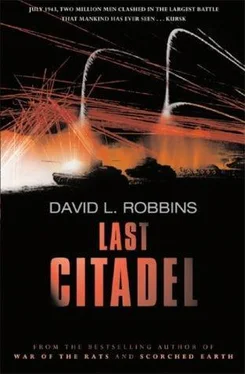Field Marshal Keitel spoke next. We have to attack in Russia this summer, he said. For military as well as political purposes. Our allies demand that Germany not be passive in the East. The Italians need to see our resolve, as do the Finns and the Turks. Japan is concerned that we have not made sufficient progress against Russia. The German people require this, as well. The bombings and the failure at Stalingrad have taken their toll on morale. We must fight and win, Germany must retake the momentum. Our troops insist on a victory. Hitler listened and nodded, swayed again by whatever voice held the floor.
Breit backed quietly out of the room while Keitel talked. He came out here alone into the bannered hall and smoked.
The great door to the conference room slid open. Another black uniform with silver gleams and black leather strapping, the garb of the SS, slipped out. From the pack in his hand, Breit shook out the nub of another cigarette and held it up.
‘Captain Thoma.’
The young SS officer accepted the cigarette and a light. He sucked the first drag down like a man without fear of ever dying, smiling and posing in the soft light, his blond head tilted back.
‘What do you think, Colonel?’ Thoma asked. The captain had been invited to the conference to speak to the training progress of the SS tankers in their new Tiger Mark VIs. Thoma, too, had been ignored by the generals during the meeting, left to stand aside as some kind of statuary, an example for Hitler of how attractive Germany’s soldiers were.
He spoke now with the smoke coming out of his nostrils like a young dragon.
Breit said, ‘I think, Captain, they don’t care a fig about what you and I have to say.’
‘I suspect they should listen. You and I know more than all of them put together.’
‘Do we?’
‘Did you hear what Guderian asked? “Why should we attack in the East at all this year?” Of course we should attack.’
Yes, Abram Breit thought, I heard Guderian, the general in charge of rebuilding Germany’s armored forces. And I heard Hitler’s reply: ‘Whenever I think of the attack my stomach turns over.’
‘Tell me, then, Captain, why you believe we should attack Russia this summer. Even if we grind through those growing Russian defenses, will we be able to hold our gains? The Reds outman us two to one, they outgun us two to one. And after we surround the Soviets, can we keep the pocket sealed? Will we be able to clear the pocket with the forces we’ll have left after fighting our way to Kursk north and south? In view of all this, tell me why Guderian is wrong, Captain.’
Thoma tossed his cigarette to the polished floor and ground it out, careless and again very young. ‘We have the tanks, Colonel. The Tigers. I’ve been training with them for the last five months. My men and I are more than ready. The Tiger can beat any tank it meets on any battlefield. Sir.’
‘But out of twenty-three hundred tanks, you’ve got only a hundred Tigers for the battle. The Soviets have over three thousand T-34s.’
‘One Tiger is worth a hundred Red tanks.’
‘Is this what you would have told the Führer if he’d asked?’
‘Yes. Absolutely’
Thoma had almost come to attention with his remarks. It seemed he was defending a maligned friend. Breit took in the tank commander’s hard posture and erect Aryan beauty. How many, Breit thought, how many of these young men will be flung into the flames to forge Hitler’s dreams?
‘What about the new Panther tanks?’
Thoma grinned a little at this. Both men knew about the difficulties the Mark V had been having in development. The Panthers had not yet proven themselves reliable, yet Hitler’s generals had insisted that Citadel be postponed for months in order that two hundred of the Panthers be built and shipped to Russia for the offensive. Thoma reveled a bit in the Panthers’ failures, none of which had cropped up in his Tigers.
‘They’ll do their best, Colonel. But the Tiger will be the tank history remembers when Citadel is done.’
‘The Americans are going to land on the Continent, Captain Thoma. We don’t know when but it will be in Italy and it will be this summer. That would be a very bad thing if we don’t have enough forces there to hold them off.’
Breit rattled out one more cigarette for himself. He would go back into the briefing after finishing it. He’d heard all he needed in the room, but did not want anyone to note his absence for too long. Breit did not want to be noticed at all.
He offered another cigarette to Thoma. The Captain shook his head.
‘There will be a Citadel, Colonel. There has to be.’
‘Why, Captain?’
‘Because this is our time.’
‘Yes, Captain. I quite agree. I think we should slip back into the room separately. It’ll be quieter that way. You first, please.’
Thoma clicked his heels unnecessarily, there had been nothing formal about their chat out here in the hall. The sound was hard, the way Thoma made himself at Breit’s doubting of the coming battle. Thoma is right, Breit thought, watching the young officer pull open the huge door and disappear behind it. There will be a Citadel. Yes, there must be. Because it is indeed Germany’s time.
Time for Germany’s doom.
May 11
1210 hours
Old National Gallery
Berlin
The Impressionists room was often crowded at lunchtime. The more beautiful the weather, the more Berliners strolled for their midday break. The Americans and the British did not bomb on perfect spring afternoons. The Yanks did their work only in the mornings, and the Brits raided at night. So far, they’d mainly contented themselves with wrecking the areas in north Berlin, the manufacturing districts. Downtown remained the nerve center for running the Nazi state, for parks and museums, and the myth of German survival.
Abram Breit carried his sack lunch, a sandwich and a French apple, here to the Old National Gallery beside the Spree River. He spotted an opening on a bench across from a Monet, a blue and violet study of the Palazzo da Mala in Venice. Monet had been so smitten with the dazzling light of Venice on his first trip there that he stayed for four months, painting the ancient facades and canal waters. Breit walked in front of the painting on flat soles, careful not to clout his polished boots against the wood floor.
He snuggled in on the bench. The buttocks of a heavy-set woman rested against his hip, she stared at a Cezanne on another wall, a sketch pad in her lap. Breit dug his sandwich out of the paper bag and unwrapped it, making a game of how quietly he could handle the wax paper. He chewed and looked at the Monet. Breit had always wanted to view the world the way a painter did, to see behind form and color to the world’s vibrations, to gaze not just at an object but at light itself. Abram Breit had tried as a child to make paintings, drawings, anything with a brush or pen, and failed; he lacked the gift of the painter, the sight. So he chose instead to exercise his love of art by becoming a student of it, then a teacher. When the war began, he was a thirty-eight-year-old professor of art history at Heidelberg University facing the reality of military service. He approached the SS, which quickly accepted him into its intelligence corps. Breit was an educated man, with the manners and bearing of the upper class. He was an exemplar of that legend of superiority the SS liked to concoct, especially in Leibstandarte , the first of the SS divisions, grown out of Hitler’s personal bodyguards.
Breit began his work for the Reich by valuating art taken from dispossessed Jews. He made no judgments on where the art came from; few in Germany did that sort of thing once the deportations started. The plight of the Jews was not his concern. Breit busied himself arranging collections and shows, selecting which pieces would be put on public display and which would hang in the private galleries of Goebbels, Speer, Himmler, Goring, Hitler. For this service, the Führer had awarded him the War Merit Cross with swords that hung on the left breast of his tunic. Breit had chosen this Monet for this museum.
Читать дальше












